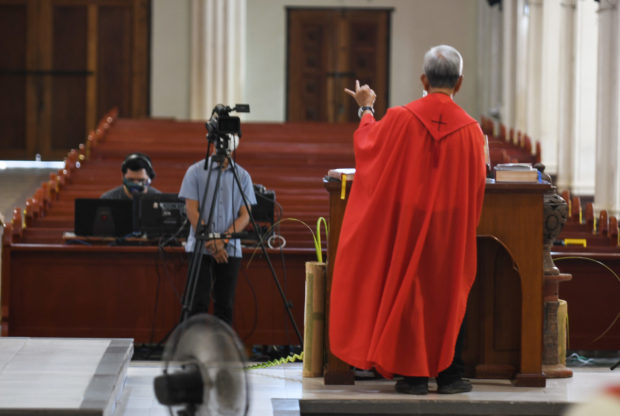
VIRTUAL MASS Monsignor Rey Manuel Monsanto delivers a homily on Palm Sunday before rows of empty pews at St. Agustine Metropolitan Cathedral in Cagayan de Oro City. The Mass is streamed online to keep parishioners in their homes while a national public health emergency due to COVID-19 is in place. —FROILAN GALLARDO
BAGUIO CITY, Benguet, Philippines —While the spread of the new coronavirus disease (COVID-19) has shuttered chapels, parishes and prayer houses in the country, the Catholic Church has embraced the role of sending aid to the faithful who are in need of food and shelter during the Luzon-wide lockdown.
The Diocese of Cabanatuan mobilized its parishes and Church organizations in distributing rice and food packs to worst-hit households in communities placed on enhanced quarantine. It launched the food relief drive, called “Alay Kapwa sa Pamayanan,” with the help of Caritas Philippines.
Catholic bishops and priests have joined pastors in other religious denominations in conducting “telecounseling” services to suspected and confirmed COVID-19 patients, according to Fr. Arnold Abelardo, spokesperson for Nueva Ecija’s interagency task force on COVID-19.
Abelardo said the task force invited the religious leaders to communicate with patients through text messages and phone calls “to give them hope and strength.”
In Bataan province, Balanga Bishop Ruperto Santos said priests from different towns had to forgo their stipends from March to May so Church workers could still receive their salaries.
Santos also said the parishes had prepared 500 bags of groceries for distribution to poor and vulnerable families. Should the need arise, he said the Catholic Church would open the doors of its diocesan seminary and schools as field hospitals for COVID-19 patients.
In Zambales province, Fr. Raymann Catindig of Holy Infant Parish in San Antonio town said the parish had distributed food packs to 1,000 families since the start of the community quarantine.
Limited resources
Despite its limited resources due to canceled Church services, he said the parish continued to get financial help from the faithful and the parish pastoral council.
“It’s the community itself that supports the parish. Some of our funds come from the priests themselves,” he said.
In Pampanga province, Fr. Eddie Panlilio, the former governor, has been distributing seeds to those who want to plant fast-growing vegetables on their farms or gardens.
The harvest could sustain families when food would become scarcer and costlier, said Panlilio.
In Cagayan province, priests have been distributing relief packs to indigents identified by members of the Basic Ecclesiastical Community.
“We also give monthly salaries and midyear bonuses to our employees in the archdiocese,” said Fr. Fredel Agatep of Our Lady of Piat Basilica Minore parish in the Archdiocese of Tuguegarao.Kind souls
In Leyte province, Fr. Chris Arthur Militante, spokesperson for the Archdiocese of Palo, said that while the pandemic had affected Church finances, “there are still some kind souls who donate to the Church amid our situation now.”
Despite the decrease in funds, the Church does not forget its role in helping the poor and those in need of assistance, Militante said.
In Negros Occidental province, Bacolod Bishop Patricio Buzon and local priests have set up a “food bank” while working closely with the government in the delivery of food packs. “We are keeping the Church present and alive among the people,” he said.
San Carlos Bishop Gerardo Alminaza encouraged people to pray every day and use social media to bring about something positive amid the health crisis.
In Albay province, Bishop Joel Baylon said the Diocese of Legazpi had extended help to their poor parishioners and local priests.
Paulo Barandon, parish priest of St. Jude Thaddeus church in Legazpi City, said the suspension of Masses had hit parishes hard.
He said many parishes had been relying on Mass collections to sustain the allowances and benefits of Church employees.
—REPORTS FROM ARMAND GALANG, GREG REFRACCION, JOANNA ROSE AGLIBOT, TONETTE OREJAS, VILLAMOR VISAYA JR., JOEY GABIETA, CARLA GOMEZ, MAR ARGUELLES AND MA. APRIL MIER-MANJARES